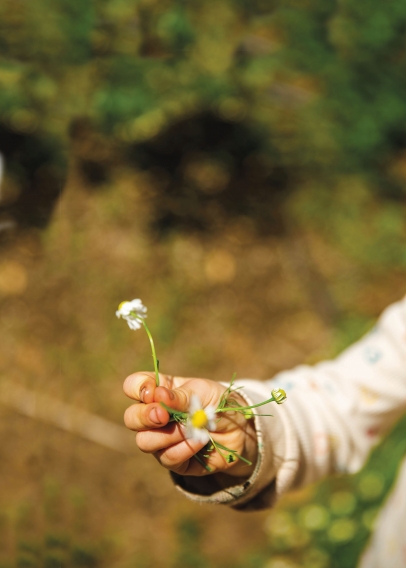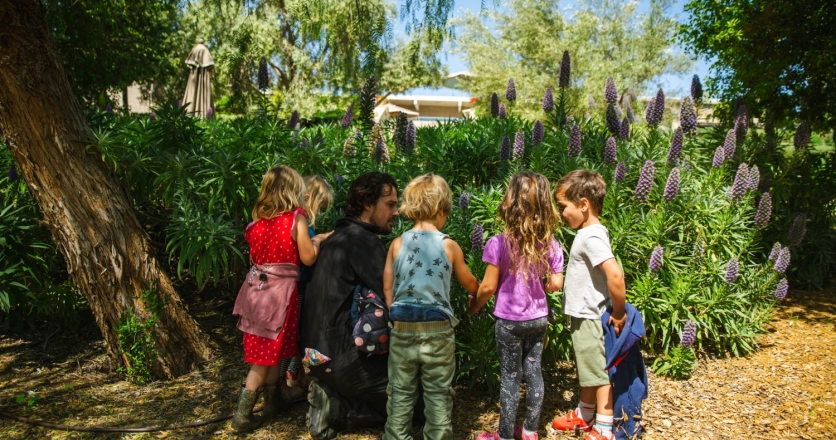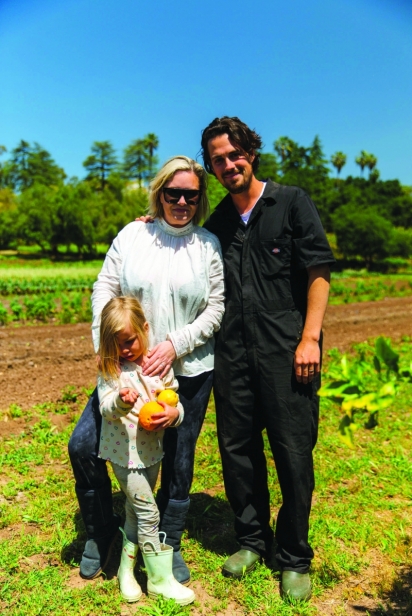School’s Out(side) Forever
The sight of a group of 2- to 10-year-old children in the forest or at a camp in lower Ojai might not seem out of the ordinary. What may be surprising is that these children are in school, and they’re not just outside for recess. Along with an Ojai farm, these locations and more serve as rotating campuses of a special educational program, Little Earth Forest School.
Forest school refers to a philosophy of open-ended education led by each child’s interests, with a high adult-to-child ratio to guide the experience. (Forest schools use the term “guides” rather than “teachers” to reflect the discovery-based approach.) The focus is not on college preparation nor conventional notions of success, but rather helping children learn who they truly are.
While other independent schools like Montessori and Waldorf share these characteristics, forest schools are different because they are held primarily outdoors. Started in the mid-20th century in Denmark by Ella Flatau, they have since spread around the world, including in Europe and the U.K., as well as Canada, the United States, Australia and parts of Asia.
Given our temperate climate, forest schools are a natural fit for California, and the founders of Little Earth Forest School were inspired by their own daughter’s experience at A Thousand Mornings Forest School in Santa Barbara. Upon relocating to Ojai, Barbara, who goes by “B,” and Garrett Smith opened the metaphorical doors of their Little Earth Forest School in late 2020, serving the Ventura County community, including their daughter Isabel.
To launch Little Earth, Garrett trained to become a level-3 certified forest school guide. He is joined by two other full-time guides along with the 15 or so kids who are present on any given day. Specialists come in on an ad hoc basis, including an ex-Cirque du Soleil artist who teaches mindful movement, and B, who taps into her profession as a nutritionist to lead cooking activities. At least one of their locations boasts a full kitchen, and she plans to step up the cooking program as the kids spend more time there.
FEEDING THE CHILDREN
In the meantime, the other campuses offer plenty of opportunities to connect children to their food, including harvesting, packaging and composting. “If they grow it, they eat it,” says B about the benefits of this experience.
Out in the forest and on the farm, kids forage for food, learning to identify edible plants like elderberries and miner’s lettuce as well as more conventional farm produce. Those foraging finds have occasionally been used to create their own play version of a farmers’ market, with acorns and special rocks serving as currency.
B explains that her hope is to one day put her nutritionist practice out of business. “If we were raised learning what food can do to us in terms of healing, and ... what the wrong foods can do to us, then I wouldn’t have that many clients anymore. It’s important to teach them while they’re young.”
OUTDOOR ENCOUNTERS
In addition to food, school outside means animals. Other than the occasional dog, there are no farm animals on the campuses, but occasionally a neighbor will bring over some chickens, and there are horses at one of the locations. And as Garrett explains, “the kids are very capable of finding their own animals,” including salamanders, lizards and snakes.
Forest school guides are responsible for scouting locations each day for environmental risks before the kids arrive, but kids are prepared for encounters with animals that can be a threat, which includes coyotes and mountain lions. “[Meeting larger wildlife] has never happened, but a lot of it is about ... highlighting [students’] skills and their capabilities and interests so that they just feel confident and safe to be who they are in any situation,” says Garrett.
On the March morning when I met the Smiths at one of the Little Earth campuses, the birds were singing, the sun was shining and snow was still visible on the Topatopas, a reminder of the recent storms that brought unusual environmental risks. These included the destruction of Foster Park, which had previously been one of the locations for the school. Still, it’s only dangerous weather that will put the kids inside. “There’s no such thing as bad weather, just bad clothing. It’s part of building resilience,” Garrett says.
TRAINING FOR PARENTS
Reflecting on the inherent risks of an outdoor environment, B observes that part of the forest school approach is training the parents, most of whom were educated traditionally. She is philosophical on this point, noting that “We do believe forest school is right for every child, but we understand it might not be right for every family.”
In addition to the benefits of exposure to agriculture, foraging, animals and weather, Garrett and B explain that the outdoor setting affords kids a more seamless transition into schooling. The theory goes that because children are familiar with playing outside, the environment is not as jarring as entering a classroom for the first time, and therefore separation anxiety is lessened.
Conversely, the transition away from forest school can also be challenging. Garrett relayed an anecdote from a recent Friday when a little girl, as she was leaving Little Earth, asked her mom if she was going back to forest school the next day. Upon being informed she would not because it was the weekend, the child responded, “It’s going to be a bad, bad, bad weekend.”
SCHOOL SOCIETY
Prior to moving to Ventura County, B spent 15 years and Garrett three years in Los Angeles, where they met while working together on B’s parenting publication, Natural Child World: Sustainability for the Modern Family. B had previously relocated from Rome, where she grew up and earned a marketing degree, moving to Los Angeles to earn a graduate degree in public relations for print and broadcasting media at UCLA before going on to lead marketing for professional beauty products at Procter & Gamble. She then opened her own marketing agency that focused only on sustainable companies.
Garrett moved to Los Angeles from Virginia, where he grew up in a big Irish Catholic family that was very involved in the community. His mom rehabilitated animals, and his experience helping her in this work cemented his interest in the natural world. He graduated with a degree in marketing and a minor in early childhood education from James Madison University, as well as an abiding sense that college was not for everyone. Their path to opening a forest school may not have been planned, but reflecting on their life experience, it seems a natural culmination.
As of this writing, 28 kids are enrolled in Little Earth Forest School, participating between two and five days each week, some as a supplement for home schooling. The kids are not segregated by age, which B explains means that they “work like a small society; you can be a mentor, a buddy.”
This year the Smiths launched a more formal K–5 full-time program, called AWE (which stands for Advanced Wholistic Education), but their aspirations extend beyond the boundaries of Ventura County. “I want more people to open forest schools because I want to change this [education] on a global scale,” says B. She also explains she is motivated by creating revenue streams for families, and the ability to “work where my kid is.”
“They’re a lot of people who are looking at outdoor education who say ‘Man, I wish I could do it,’ so we take the ‘wish’ out of it,” B says. They need to find the land, but the Smiths are providing a franchise model that includes all the other necessary tools, from contracts to content and marketing.
Twice during our conversation, B expresses her regret at not having been educated in an environment like a forest school, wondering aloud who she would have been if, in her words, “I was free to pursue my soul path and also not being offered college as the only path forward.”
But as she speaks about her intent to scale Little Earth Forest School to communities through franchising, and the potential those franchises have to create a better world, it seems that she has managed to find her calling.
“You can put a business in the hands of people that are looking for more inspirational type of work. Imagine if we multiply this by millions. You raise different humans, and then you change the world.”
And while they are dreaming big, Garrett is quick to note their appreciation for what they have built so far. “Ojai greeted us with open arms. Forest school is a natural experience for the Ojai community that thrives on connection with nature and organic relationships with the land and the people.”
For more information, visit LittleEarthForestSchool.com.







